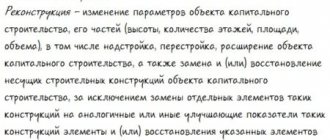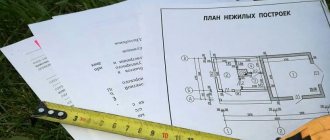Dividing a house is not as simple a procedure as it seems at first glance. The fact is that most of the real estate falls under the definition of indivisible property and, accordingly, is not subject to division. However, discord may arise in the relationship between the owners and they begin to look for solutions on how to divide the private house they own.
The division of a residential building does not contradict current legislation and we will tell you how to do it. Please note that along with the house, the land plot and the outbuildings located on it are divided . How to divide real estate to take into account the interests of each party? Let's consider the possible options.
Section of a residential building
A residential building can be divided into shares or parts, and a temporary procedure for the use of various premises can be established.
Dividing the house into parts
The most difficult thing is to divide the house in kind, into parts. In this case, each resulting part of the house can be assigned a cadastral number, and part of the house after division can be allocated as an independent property. At the same time, a land plot (division of a plot with a house) can be similarly allocated. But in order to divide the house into parts, to achieve a real division of the house into shares, you need to have at least two entrances or the possibility of arranging them, as well as in each part there are certain rooms corresponding to the purpose of the house.
Dividing the house into shares
It’s a little simpler - with shares. But there are many different options here too. The size of shares in a residential or non-residential building is determined in accordance with the reasons for the division and can have different values:
· In inheritance;
· When dividing property between spouses;
· When investing in construction;
· By agreement between the parties;
·When collecting debts, etc.
NTVP "Kedr - Consultant"
LLC "NTVP "Kedr - Consultant" » Services » Legal consultations » Housing: purchase and sale, maintenance, payment » Dispute between the owners of a house, which is divided into 2 parts, which are separated in kind (the house is partitioned by a wall into 2 halves)
The applicant Z-mova and her ex-husband's sister F-kova had a residential building with buildings with a total area of 54 sq.m. in common shared ownership (1/2 share each) since 2001.
In 2007, F-kova filed a claim against Z-mova for the allocation of her share in kind. The parties entered into a settlement agreement, according to which F-kova was assigned ownership of part of the home in the form of a living room with an area of 31 square meters. m, and Z-mova has the right of ownership to the remaining areas of the residential building, and also established F-kova’s obligation to install a solid brick wall 350 mm thick along the existing wooden wall with a doorway between the premises allocated to the Parties.
But F-kova for a long time refused to fulfill the obligation to build a brick wall, and therefore, in 2009, Z-mova filed a lawsuit to force F-kova to build a brick wall, she won the claim, but the legal costs for the representative were from the defendant F -I didn’t exact any money.
In 2012, F-kova received a certificate of ownership, where in the “name of the object” section it indicated “residential building” with an area of 27 square meters. m, and not “living premises”, as the applicant Z-mova would like. F-kova scares the applicant by saying that he will demolish his part of the house and the brick wall.
The applicant filed a statement of claim against F-kova, demanding that F-kova’s right of ownership be declared absent. The claim was rejected, the appellate instance left the decision of the 1st instance unchanged. The defendant filed a petition with the court for reimbursement of legal costs. Next, the applicant filed a lawsuit demanding that the cadastral passport and technical documentation issued for F-kova’s residential building be invalidated and that amendments be made to the Unified State Register of Real Estate and Registered Information.
Applicant's questions:
1. Is it necessary and possible to appeal to the cassation court the court’s decision to refuse to satisfy the requirements to recognize F-kova’s right of ownership of a residential building as absent?
2. Is it possible to recover legal costs for a representative from F-kova. in a case won in 2009?
3. Will the Defendant have to pay the costs of a lost case?
4. Are there any chances of winning a new claim?
5. When considering my case, does the judge have the right to insult me and generally give any advice or criticize my actions and statements?
6. If F-kova sells her part of the home, do the new owners have the right to demolish the brick wall erected between the premises? And what if they do this?
During the consultation, the following issues were clarified:
Who drafted the statements of claim and is a lawyer or lawyer currently helping you in resolving your controversial issues?
What is the current violation of your rights in your opinion? What specific actions does F-kova perform in relation to you and your property?
Do you and F-kova actually use (live) in the disputed residential building?
Do your living quarters and F-kova’s premises have conditions to satisfy household and other needs (water supply, electricity, gas supply, sewerage, etc.)?
Are there individual entrances to designated premises?
After the brick wall was erected, was the area measured by an inventory technician?
Is the land plot under the disputed residential building divided in kind?
Have you written complaints or statements to Rosreestr and Federal State Unitary Enterprise Rostekhinventarizatsiya?
In which court was the claim for recognition of the absence of property rights heard?
Which judge?
At what stage is the consideration of the claim for invalidation of technical documentation (cadastral passport, etc.)?
Which judge accepted the case?
Additional materials were also requested and reviewed:
settlement agreement of the Parties (original);
ruling of the district court of Izhevsk on approval of the settlement agreement;
statement of claim for recognition of the absence of property rights;
ruling of the Supreme Court of the Urals to leave the decision of the district court of Izhevsk unchanged;
cadastral passports for a residential building before and after the allocation of shares;
certificates of ownership of both parties;
a statement of claim to invalidate the technical documentation and make changes to the Unified State Register and Registered Information Record;
refusal of Rosreestr to make changes to the information of the Unified State Register.
Lawyer's answer.
Based on the documents and responses submitted, the circumstances of the case are as follows. According to the ruling of the L-sky District Court of Izhevsk from 2009 on the approval of the settlement agreement, Z-mova has the right of ownership to part of a one-story residential building - premises with an area of ... sq. m. m, located at: Izhevsk, st. A., d XX. F-kova has ownership rights to a room with an area of 31.5 square meters, located in a residential building at the above address. According to the certificate of ownership and cadastral passport no. . . dated 2012, the Office of Rosreestr for the Urban Development registered F-kova’s ownership of a residential building with an area of 27.7 sq.m., located at the address: Izhevsk, st. A., d XX. According to an extract from the cadastral passport No.... dated... 2012, the Rosreestr Office registered the ownership of a residential premises with an area of... sq.m., located at the address: Izhevsk, st. A., d XX.
According to the submitted documents and explanations of the applicant, the allocated premises of both parties have individual entrances, but do not have water supply, are not equipped with gas or electric stoves, or bathrooms.
The land plot under the disputed household is also divided between the disputing parties along an erected brick wall separating the allocated premises.
Currently, F-kova is not demolishing his part of the home ownership, does not violate the boundaries of use of land plots and residential premises.
In 2012, the L-sky district court of Izhevsk (judge M.), following the claim of Z-mova against F-kova for recognizing the ownership right as absent, made a decision to refuse to satisfy the claims. By the decision of the Supreme Court of the Republic of Uzbekistan in 2013, the decision of the court of 1st instance was left unchanged. The case was not considered by the cassation court. The deadline for filing a cassation appeal has not expired.
Z-mova’s statement of claim against F-kova for invalidating the technical documentation and making changes to the information of the Unified State Register and KNI was accepted for proceedings by the L-sky District Court of Izhevsk by Judge M., and a preliminary hearing was scheduled.
On November 21, 2013, a court hearing was scheduled to consider Defendant F-kova’s petition for reimbursement of legal expenses for a representative (in a lost case).
The controversial legal relations of the Parties are in the field of property rights and the sub-branch of civil law - housing law, which are quite clearly regulated in accordance with the Constitution of the Russian Federation by the norms of the Civil Code of the Russian Federation, the Housing Code of the Russian Federation, as well as federal laws issued in accordance with them, decrees of the President of the Russian Federation, Resolutions The Government of the Russian Federation, regulatory legal acts of federal executive authorities, adopted laws and other regulatory legal acts of constituent entities of the Russian Federation and local governments. In particular, the Decree of the Government of the Russian Federation dated January 28, 2006 may be applied to disputed relations. No. 47 “On approval of the Regulations on recognizing premises as residential premises, residential premises unsuitable for habitation and...”.
Article 209 of Chapter 20 of the Civil Code of the Russian Federation reveals the content of the right of ownership and in Part 2 of the said article establishes the right of the owner “at his own discretion to take any actions in relation to his property that do not contradict the law and other legal acts and do not violate the rights and interests protected by law of other persons "
According to Article 304 of the Civil Code of the Russian Federation, the owner may demand the elimination of any violations of his rights, even if these violations were not associated with deprivation of possession.
Chapter 2 of the Housing Code of the Russian Federation dated December 29, 2004. No. Ш-Ф3 defines what is the object of housing rights, and in part 1 of Article 16 reveals the content of the term “residential premises”, which include:
- residential building, part of a house;
- apartment, part of an apartment;
- room.
According to Part 2 of the said article of the Housing Code of the Russian Federation, a residential building is recognized as an individually defined building, which consists of rooms, as well as premises for auxiliary use, intended to satisfy citizens’ household and other needs related to their residence in such a building.
In accordance with Art. 18 Housing Code of the Russian Federation right of ownership; and other real rights to residential premises are subject to state registration in cases provided for by the Civil Code of the Russian Federation, the Housing Code of the Russian Federation, and the federal law on the registration of rights to real estate and transactions with it.
Civil legal relations arising in the process of civil proceedings are regulated by the norms of the Civil Procedure Code of the Russian Federation dated November 14, 2002. No. 138-F3.
The activities of judges must be carried out within the boundaries of their powers in accordance with Federal Law No. 1 “On the Judicial System of the Russian Federation” dated December 31, 1996, and the Law of the Russian Federation dated June 26, 2012. “On the status of judges in the Russian Federation”, the Federal Law “On Bodies of the Judicial Community in the Russian Federation” and the norms of the Code of Civil Procedure of the Russian Federation, subject to their strict adherence to the Code of Judicial Ethics.
In accordance with the current norms of the Housing Code of the Russian Federation, the Civil Code of the Russian Federation, based on the factual circumstances of the case, it seems that, on the merits of the issue, the applicant’s problem is largely far-fetched and is the result of a misunderstanding or ignorance of the basic provisions of the current legislation (the Housing Code of the Russian Federation) on the objects of housing legal relations and, to Unfortunately, to some extent, competent support of the client by specific lawyers is not enough.
According to Art. 15 of the Housing Code of the Russian Federation and clause 5 of the Decree of the Government of the Russian Federation of January 28, 2006. No. 47 “On approval of the Regulations on recognizing premises as residential premises, residential premises unsuitable for habitation and...” (hereinafter referred to as Resolution No. 47) the concept of residential premises is general and combines the following types: a residential building and its part, an apartment and its part, room.
In accordance with paragraph 41 of Resolution No. 47, the mere absence of a centralized sewerage and hot water supply system in a one- and two-story building is not grounds for declaring the premises unsuitable for habitation.
In fact, at present the applicant’s rights have not been violated by anyone.
According to Part 1 of Article 2 of Federal Law No. 122 of July 21, 1997 “On state registration of rights to real estate and transactions with it,” state registration of rights to real estate and transactions with it is only a legal act of recognition and confirmation by the state of the occurrence, restrictions (encumbrances), transfer or termination of rights to real estate in accordance with the Civil Code of the Russian Federation.
In essence, the act of registration (and documents on its implementation) does not create, liquidate or change the right itself. Technical documentation contains only a description of real estate and the scope of rights, and the process of their development does not essentially affect.
Based on the meaning of the explanations contained in paragraph 45 of the Resolution of the Plenum of the Supreme Arbitration Court of the Russian Federation No. 10 and the Plenum of the Supreme Arbitration Court No. 22 of April 29, 2010. “On some issues arising in judicial practice when resolving disputes related to the protection of ownership of other property rights”, a claim to eliminate violations of the right not related to deprivation of possession must be satisfied if the plaintiff, who is the owner, proves that by actions the defendant, not related to deprivation of possession, his property right or legal possession is violated, or if the plaintiff proves that there is a real threat of violation of his property right or legal possession by the defendant.
But in essence, the plans were drawn up correctly, the area of the premises changed in connection with the construction of the wall, and in a way favorable to the applicant (the area of F-kova decreased by 3.8 sq. m compared to that fixed under the settlement agreement of 2007).
Based on the above, applicant Z-mova was advised to approach Judge M. and personally (but not in court) inform about the lack of intentions to support her claim with a request to set formal dates for hearings and leave the claim without consideration: But from the claim officially (on the record ) not to refuse, since the claim contains one claim, which, when clarified and if grounds arise (violation of the plaintiff’s rights), can be submitted again to the same defendants.
From the applicant’s words, it is obvious that there were violations in the actions of the employees of the Federal State Unitary Enterprise Rostekhinventarizatsiya, who, without visiting the site of a specialist technician, drew up plans for the formed premises (after the construction of the brick wall of F-kova).
Of course, according to Part 1 of Art. 246 of the Code of Civil Procedure of the Russian Federation, a citizen or organization has the right to challenge in court a decision, action (inaction) of a government body, local government body, official, state or municipal employee if they believe that their rights and freedoms have been violated.
Article 255 of the Code of Civil Procedure of the Russian Federation provides that decisions, actions (inaction) of state authorities, local government bodies, officials, state or municipal employees, contested in civil proceedings include collegial and individual decisions and actions (inaction), as a result of which the rights and freedoms of a citizen are violated; obstacles have been created to the citizen’s exercise of his rights and freedoms; a citizen has been unlawfully assigned any duty or has been unlawfully held accountable.
In accordance with the provisions of Article 21 of Federal Law No. 122 of July 21, 1997. “On the state registration of rights to real estate and transactions with it”, technical errors in records made during the state registration of rights are corrected within 3 days by decision of the state registrar after discovering an error or receiving a written statement about the error from any interested party records. Participants in relations arising during the state registration of rights must, within the same period of time, receive information in writing about the correction of a technical error. Moreover, in cases where there are grounds to believe that the correction of a technical error may cause harm or violate the legitimate interests of copyright holders or third parties who relied on the relevant registration records, such correction is made by court decision.
If, as a result of a technical error, harm was caused to individuals or legal entities, such harm is compensated in accordance with Article 31 of Federal Law No. 122.
It is obvious that violation of the procedure when creating technical documentation about a real estate property during the inventory process does not in itself violate the rights and freedoms of the applicant; no obstacles have been created to the exercise of her rights and freedoms; the citizen was not illegally assigned any duty and he was not illegally held accountable.
Thus , to challenge the actions of the Federal State Unitary Enterprise Rostekhinventarizatsiya.
In accordance with Article 35 of the Constitution, Articles 209, 210 of the Civil Code of the Russian Federation, each owner exercises his rights at his own discretion, but subject to strict compliance with the law and not violating the rights of other persons.
In the event of actual violations of the applicant’s property rights, harm, damage to her property (both by F-kova and the new owners in the event of alienation of property), she has the right at any time to file a claim in a court of general jurisdiction to restore her rights and compensation damages caused.
In accordance with Article 208 of the Code of Civil Procedure of the Russian Federation, the limitation period does not apply to the demands of the owner or other possessor to eliminate any violations of his rights, even if these violations were not associated with deprivation of possession.
The opinion was expressed that there are no grounds for filing a cassation appeal against the decision of the L-sky District Court of Izhevsk, which entered into legal force, to refuse to satisfy the claims for recognizing the ownership rights as absent. The court correctly applied the norms of substantive and procedural law, the circumstances of the case were investigated and established by the court correctly. There are no grounds provided for in Article 387 of the Code of Civil Procedure of the Russian Federation for canceling decisions of the courts of the 1st and 2nd instance in cassation.
Regarding the relationship with specific representatives of the judiciary, the applicant was given an explanation that, in accordance with Part 2 of Art. 12 of the Code of Civil Procedure of the Russian Federation of the provisions of the Plenums of the Armed Forces of the Russian Federation, Articles 9-11 of the Code of Judicial Ethics, the court must, while maintaining independence, objectivity and impartiality, manage the process and create conditions for a comprehensive and complete examination of evidence, establishment of factual circumstances and correct application of the law when considering and resolving civil business
Insulting the participants in the trial by the court is a gross violation. In this case, in the judicial process, it is necessary to stop this kind of “attacks” and declare to the court in accordance with Art. 16 of the Code of Civil Procedure of the Russian Federation, challenge and write a complaint against the actions of the court to the Qualification Board of Judges of the Urals.
For the future, advice was given to take advantage of the right granted by Articles 35, 77 of the Code of Civil Procedure of the Russian Federation and introduce into practice audio recording of court hearings with copies attached to the minutes of court hearings, this will allow discipline of all participants in the process.
For legal costs: according to Art. 98 of the Code of Civil Procedure of the Russian Federation, the court orders the party in whose favor the court decision to reimburse the other party for all legal expenses incurred in the case, except for the cases provided for in Part 2 of Art. 96 Code of Civil Procedure of the Russian Federation. If the claim is partially satisfied, the specified costs are awarded to the plaintiff in proportion to the amount of the claims satisfied by the court, and to the defendant in proportion to the part of the claims that were denied to the plaintiff.
Based on the content of Art. Art. 88, 94 - 100, part 5 art. 198 of the Code of Civil Procedure of the Russian Federation, issues of distribution of legal costs are resolved by the court that considered the case on the merits, simultaneously when making a decision. If the issue of distribution of legal costs was not resolved when the decision was made, it can be resolved in accordance with paragraph 3 of Part 1 of Art. 201 of the Code of Civil Procedure of the Russian Federation by issuing an additional decision. According to Part 2 of Art. 201 of the Code of Civil Procedure, the issue of adopting an additional court decision may be raised before the court decision enters into legal force.
Since the applicant’s court decision has already entered into force, the issue of collecting legal costs must be resolved in accordance with Art. 15 of the Civil Code of the Russian Federation by filing a claim for damages.
Lawyer Avdeeva Olga Vyacheslavovna,
Consultation was given in November 2013.
How to divide a house?
The division of a house always begins with a legal examination of documents (who owns what share) and determination of the actual established order of use. Lawyers or advocates who practice in matters of house division can immediately (from their practice) offer one or more options for dividing a house. They will also tell you the prospects for such a division in an extrajudicial or judicial manner.
The complexity in such a case is further enhanced by the fact that the norms of legislation used in such a division are combined from several institutions of law: housing, civil, family, land, etc. Only with a cumulative analysis of all legislative norms can a good solution be born that will be convenient and home owners, and the court (if a lawsuit is necessary).
Sometimes a technical division (real division) of a house is not possible at all. Then the following options can be used:
— redevelopment of premises;
— reconstruction of the house;
— establishing a procedure for using the premises or a schedule for using the entire house;
- compensation;
— sale or donation of a share or part of a share;
— other agreements, incl. monetary compensation, etc.
We divide the house into apartments
One of the options for dividing a private house into isolated parts belonging to individual owners is to divide such housing into apartments with subsequent transfer from a private building to an apartment building.
To do this, the common premises in the house are rebuilt into separate apartments, after which they contact the administration with an application to transfer the house into an apartment building.
To transfer a private house to an apartment building, owners must:
- Contact an architectural firm to create a project;
- Approve the created project in the BTI and public utilities;
- Hire a contracting company and carry out work to renovate the house;
- Contact the administration to change the type of permitted land use of the site;
- Write an application to the Town Planning Committee to transfer the house to an apartment building.
Employees of an architectural firm create a project, according to which contractors make entrances to apartments inside the house and perform other work.
Private houses are located on plots intended for individual housing construction, so it is necessary to change their additional type of permitted land use to “Land for low-rise construction”.
This transfer occurs through public hearings in the administration. As arguments, the owners of the house cite the need to divide the house into separate apartments.
After changing the purpose of the site under the house, the owners again contact the administration with a statement outlining the need to transfer a private house to an apartment building on the basis of:
- The actual condition of the house;
- Changed purpose of the site.
The application is considered for 30 days, after a positive response, the owners receive new technical passports from the BTI, and on their basis they register ownership of the apartments in Rosreestr.
Advice from a lawyer on the topic “Division of a house”
- It is better to divide the house as soon as the right to shares appears. Then a fairer version of the agreements is possible. Everyone will get approximately equal space (if such a thing is even possible).
- If you do not use the house for years, other users may consider the house their sole property and make (in violation of the law) redevelopment, complete or destroy parts of the house, or fence off the area. In practice, there was a court case when the second owner built a brick fence and got three evil dogs guarding the entire territory...
- It is necessary to complete the documents completely. Half measures here may cause future problems. For example, when inheriting part of a house, it is not enough just to submit an application to a notary to enter into an inheritance; you must obtain a document on ownership. When dividing property under a marriage contract, it is imperative to properly inform the Registration Chamber (register the contract) and notify third parties (for example, the chairman of the SNT).
- If you divide the house and land into shares, you cannot delay this issue at all. Legislation on land changes quite often, the rules of registration, assignment of cadastral numbers, and the very possibility of division may change over time. And sometimes performance may be “temporarily unavailable.” It is important to understand when such an opportunity exists and get down to business very quickly.
Contact us for help.
Contents of the statement of claim
The requirements for statements of claim are more or less the same for all types of claims: business style, absence of errors and blots in the test, compliance with the general form of business documentation (“header”, title, main part, date and signature at the end). Writing method - handwritten or printed (previously documents were printed on a typewriter, now this can be done using a computer). All this is recorded in detail in Article No. 131 of the Code of Civil Procedure of the Russian Federation.
The application must indicate:
- Full and exact name of the court, plus sometimes the name of the judge
- Full names and addresses of the plaintiff and defendant (if the registration and actual addresses are different, both should be written)
- Cost of the claim (since the division of the house refers to property claims, and the fee for it is calculated depending on the price of the house, cadastral or market)
- Circumstances of the claim (data on marriage and divorce, data on the purchase of a house, the need for its division, additional information) with links to the attached documents
- Claim (to divide the house)
- Links to legislative norms giving rise to the claim
- List of attached documents, which must include: Copies of passports, marriage/divorce certificates
- Title documents for real estate (house) and documents confirming its value
- Duty payment receipt
And also (depending on availability and need)
- marriage contract
- separation agreement
- children's data
- and anything else that the court requires
A sample application can be found and downloaded on the Internet, or you can write it yourself with the help of a lawyer. All documents are submitted to the office in triplicate. After the case is accepted, the first meeting is scheduled a month later. Further, either the court makes a decision on division (it comes into force after another month, during which the defendant can challenge it), or schedules a new hearing if additional documents and evidence are required.











